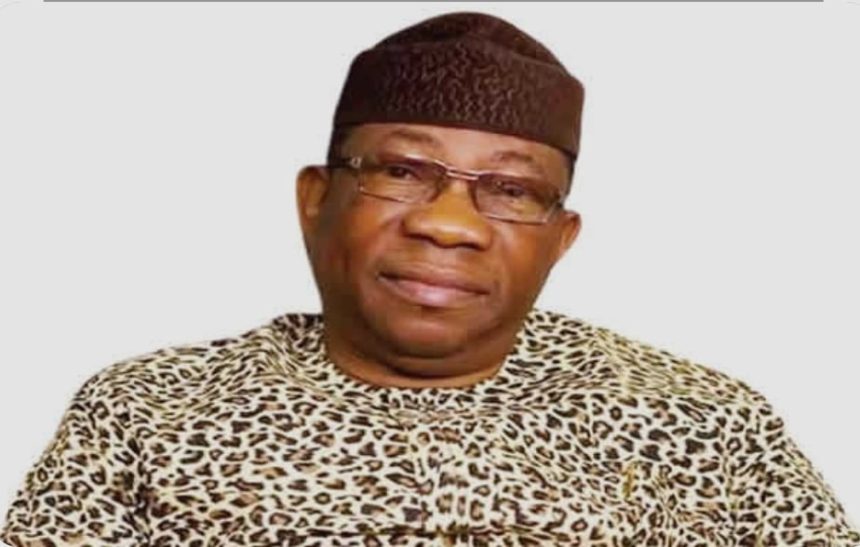The immediate past State Commander of Osun State Security Network, otherwise known as Amotekun Corps, Brigadier General Bashir Adewinbi (retd), has suggested a way to keep active senior military officers who are often forced into retirement after the appointment of new service chiefs.
Adewinbi, in an exclusive chat with PUNCH Online on Sunday, said in advanced countries, reserve lists are usually created for exiting military officers, where they are put, and from there, they continue to contribute whenever their services are needed.
The ex-Army officer, who said military personnel who are seniors of the appointed service chiefs must go on retirement, noted that such practice is not peculiar to Nigeria.
“In the first instance, the appointment of Service Chiefs is like a posting,” Adewinbi said.
He added, “It is a routine exercise. Secondly, Mr President is the Commander-in-Chief of the Armed Forces of Nigeria. He has the prerogative to appoint anybody at any time. He is the chief strategist of Nigeria. He has every power to appoint anybody.”
On how to limit the negative effects of mass exit of experienced officers whenever new service chiefs are appointed, Adewinbi said, “On the issue of people retiring prematurely, the National Assembly can debate on the creation of a reserve list.
“Whoever retires after the appointment of new service chiefs can be put on the reserve list. After all, we are being paid our entitlements till tomorrow, and some of us are still active.
“It is like that in some advanced countries. When you retire, you move into the reserve list. It is not out of place to do it in Nigeria. They will not be in active service, but they will be contributing when needed.”
Commenting further, Adewinbi said Tinubu have the power to change service chiefs and bring on board those that could help him deal with the security challenges facing the country, insisting that “In view of the security situation we faced, the President needs to do something and bring people who will bring a positive result.”
He continued, “Whenever we have a change, the seniors need to retire because they can’t serve under their juniors. It is a routine exercise, but the only thing is for the National Assembly to create a reserve list to accommodate those retiring from the country to further benefit from their expertise.”
Mass retirement of top cadre military personnel that often occurs whenever new service chiefs are appointed has been an issue of concern in many quarters.
PUNCH Online on October 27, 2025, reported that about 500 generals were forced out of service despite rising insurgency in the last 8 years due to the change of service chiefs at different times.
Those forced into exit are said to include those in the ranks of Major-Generals, Brigadier-Generals, Rear Admirals, and Air Vice Marshals.
They were forced into early retirement following the changes of service chiefs under the Muhammadu Buhari and Bola Tinubu administrations.
The mass retirements, spanning the Army, Navy, and Air Force between 2015 and 2023, stemmed from the long-standing military tradition of disengaging senior officers who are either senior to or of the same course as newly appointed service chiefs.
The move, according to the military, is aimed at maintaining discipline, hierarchy, and operational efficiency within the services.
Data collated from media reports indicate that over 500 top officers have quit the services in the past eight years.
The mass retirements, spanning the Army, Navy, and Air Force between 2015 and 2023, stemmed from the long-standing military tradition of disengaging senior officers who are either senior to or of the same course as newly appointed service chiefs.
The move, according to the military, is aimed at maintaining discipline, hierarchy, and operational efficiency within the services.
Data collated from media reports indicate that over 500 top officers have quit the services in the past eight years.
However, military insiders asserted that the affected Generals numbered approximately 900 or more. PUNCH Online could not immediately confirm the figure as the military authorities could not be reached to authenticate the claim.
The first wave of retirements occurred shortly after former President Muhammadu Buhari appointed new service chiefs in July 2015.
They include Lt.-Gen. Tukur Buratai as Chief of Army Staff, Air Marshal Sadique Abubakar as Chief of Air Staff, and Vice Admiral Ibok-Ete Ibas as Chief of Naval Staff.
Over 100 senior Army officers, mainly Major Generals and Brigadier Generals, were forced to retire, while the Navy lost over 20 senior officers, including Commodores and at least one Rear Admiral.
A second phase was recorded in 2021 after Buhari replaced all the service chiefs and appointed a new set of Air Marshals, including Air Marshal Isiaka Amao (Air Force), late Lt.-Gen. Ibrahim Attahiru (Army) and Vice Admiral Awwal Gambo (Navy).
That exercise saw about 123 generals exit the Army, while over 50 senior Air Force officers, and another 50 naval officers also left service.
The Army again witnessed another wave in May 2021 following the death of Gen. Attahiru, which led to the appointment of Gen. Farouk Yahaya, who was junior to several serving generals.
His emergence triggered the voluntary retirement of over 20 generals from Courses 35 and 36.
Under President Tinubu, the pattern has continued. Two weeks after he assumed office, the President, on June 19, 2023, appointed new service chiefs, prompting mass retirements across the services.
The appointment of late Lt.-Gen. Taoreed Lagbaja, Air Marshal Hasan Abubakar, and Vice Admiral Emmanuel Ogalla, as the heads of their respective services, led to the untimely retirement of 51 army generals, 49 top Air Force officers and 17 naval officers.
Last Friday, Tinubu executed a shake-up in the military leadership. Gen Olufemi Oluyede replaced Gen Christopher Musa as CDS; Maj-Gen Waidi Shaibu becomes the COAS; Air Vice Marshal Sunday Aneke takes over as CAS, while Rear Admiral Idi Abbas assumes office as CNS. The Chief of Defence Intelligence, Maj-Gen Emmanuel Undiendeye, retains his position.
Under the latest development, about 60 top officers are expected to disengage from service should the military tradition continue.









